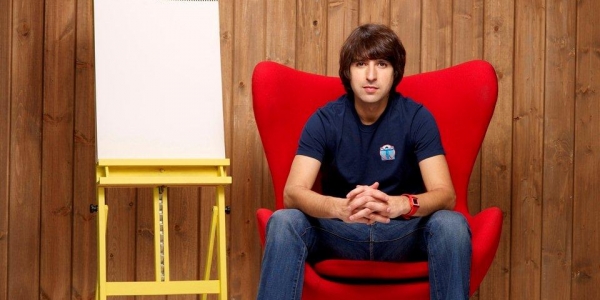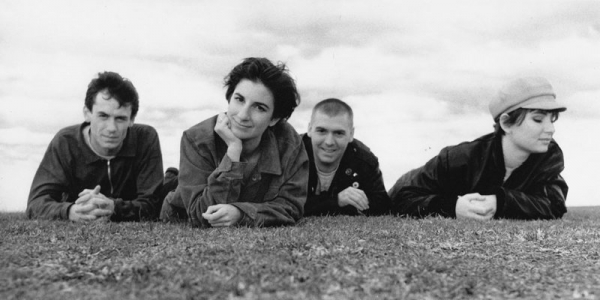Important Things With Demetri Martin , the TV show which ran for two seasons on Comedy Central in the US (as well as being aired on ABC locally), was a sketch program based around Demetri’s stand-up routines. Though he had a fair amount of creative freedom in regards to the show’s format, Demetri can’t help but feel somewhat disenfranchised with the whole process. “Well, it was interesting. I had a pretty good degree of freedom in terms of content of the show, and which direction I wanted the show to go in. But constraints of time and money made it very difficult to do a lot of the things I wanted to do. I can’t really complain about Comedy Central tying my hands and telling me that I can’t do this or that – within reason. I had a pretty good degree of freedom. But restrictions on time and budget made it difficult at times. I remember at one point we were working on the show, and Comedy Central told us that they wanted the show to air at this time, premiere on this week rather than the week we agreed on. So that made the show air earlier by a month, or whatever it was. So things like that would happen. Or while we were writing episode seven and editing episode two, I get a call that I have to do press or the promos are going to go out in 24 hours. So then I have to stop everything and go deal with marketing people,” he recalls plaintively. “Then I’d look at the commercials and say, ‘I wish you guys had told me earlier, because that’s my face with the giant font next to it and the weird music.’ It’s just not me and my taste. You can’t really beat a corporation. There’s a whole mechanism in place, so that juggernaut just rolls on and you have to go with it. So they’re the specific difficulties of that reality, for me.”
Though the process of creating Important Things was a difficult one, Demetri remains optimistic in regards to any future pursuits in television. “I think what I learned was that I’m not interested in doing a show in the future where I play myself. Then I have to market myself and the show. Unless it’s a stand-up special – where I’m here to maintain control over my identity. I’m happy to do other shows, but I won’t be making that mistake again where it’s a case of, ‘Hey, this is me: Demetri. I’m here to do stand-up, then show a couple sketches I wrote with my friends, and I’m selling you my self through Comedy Central.’ It’s just not a good model. It’s hard for that to end up being fun.”
Despite a reputation as one of the most hilarious comedians in the game, Demetri is yet to star in a film which could be classified as a conventional comedy. Films such as Taking Woodstock, as well as Steven Soderbergh’s upcoming blockbuster Contagion, possess a dramatic quality that far outweighs any comedic bent. “It was funny on Woodstock because Ang would keep saying ‘this is a comedy’. Relative to some of his other films, it is a comedy,” he ponders. “I didn’t see it so much as a comedy, it seemed like more of a dramatic film. There’s a storyline in the movie where I was having an affair with a married guy, which all led to a break-up scene. None of that was comedic, though that storyline was taken out of the movie. But the movie I shot with them didn’t feel so much like a comedy – I was excited to have the opportunity and the challenge. Then I was thrilled to work with Steven Soderbergh. You know, I’d love to be in an all-out comedy. I’d love to be in a really dramatic movie. What I’m trying to do know is write movies now that I can direct. So if I have a specific tone or an idea in mind, then be able to put my money where my mouth is and execute it. I can see that it’s not easy to get financing and distribution. It’s a tricky business to break into. I dunno, but that seems like it’s worth going for. A lot of the things I’m still inspired by a more about telling a story a certain way, or getting a joke to work a certain way, or playing out a scene a certain way. If people want to put me in movies, then I’m thrilled to be able to have that opportunity. It doesn’t come along that often for me, but if it does and it sounds like a good movie, then that’s ok with me.”
Watching the trailer for Soderbergh’s thriller Contagion, it’s hard to imagine how a well-known comedian could fit in amongst the intense drama of a virus-outbreak storyline. “Well I don’t think I can give away anything, but I have a small role in the movie. I play a scientist in a few scenes where we’re trying to figure out just what this virus is. I don’t even know how many of my scenes will make it into this movie at the end of the day. I only worked a couple days on set. I think Steven is such a smart guy, and he has quite a body of work built up at this point. While he and Ang Lee are very different entities, in both cases they’re the attraction from where I’m standing,” he states in admiration. “It’s their world that they’ve created. I can’t say whether I’d be a sore thumb in it [Contagion] tonally or visually. But when I was on set, it felt like Steven was using me correctly. My character isn’t the most serious character in the movie. While I’m not joking around that much, he does use me as a counterpoint – something a little bit lighter. It probably just plays more naturally than what somebody would expect from somebody like me,” he muses.
Demetri won’t just be popping up on Australian big screens this year, with his long-awaited return to the stand-up stage finally taking place at the end of the month. “The root of all my live stand-up stuff has been just jokes. Very old fashioned, a lot of them one liners. In my longer shows, or when I’m doing a very short set for television, I try to mix it up a little bit. Most of the stuff I’ve probably tried without a guitar or a keyboard, or whatever I’m playing at the time. Sometimes I like to put something with it, just to accompany the jokes – often because I’m doing a long show. If I’m doing 90 minutes, I might want to diversify the presentation to the audience over the course of those 90 minutes – to have little segments, basically. And also, for my own personal challenge or entertainment, I try to play something different when I talk, or to balance the metre of the jokes with the rhythm of the music. Just thinking things like, ‘Can I say this while doing a chord change here while improvising with the audience?’ That’s enjoyable to me. I think it’s like a mode of learning. I like it.”

